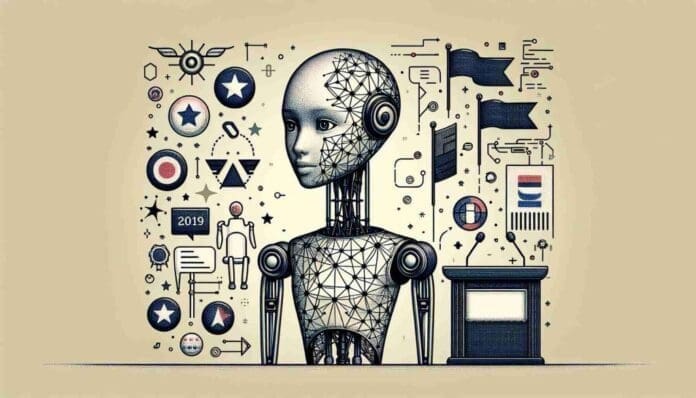Republican Scott Perry, who was influential in disputing the 2020 election results and is affiliated with Trump, is running for reelection, and Democrat Shamaine Daniels is competing for his seat in Congress. Ashley, an AI campaign volunteer, is Daniels’s latest weapon in her underdog bid. Last year, she lost to Perry by fewer than 10 points.

Ashley has never heard prerecorded or robotic responses, making her stand out from the usual robocaller. According to her designers, she is the first political phone banker driven by generative AI technology. They plan to deal primarily with Democratic campaigns and candidates. She can hold an endless number of simultaneous personalized one-on-one chats. A new age of political campaigning is dawning, with candidates using technology to interact with voters in ways that are becoming more and harder to trace, and Ashley is a pioneering example of this.
Some see it as a revolutionary new way to simultaneously have meaningful discussions with many people. Some are concerned that this could further exacerbate the problem of disinformation in the already divisive American political climate, where “deepfakes,” or artificial intelligence-generated films and pictures that appear real but are fake are a constant threat.
Ashley contacted hundreds of Pennsylvania voters over the weekend on behalf of Daniels. Ashley studies voter profiles to personalize interactions around their important topics, much like an experienced campaign worker. Ashley is unbelievably reliable; she never misses a shift, knows precisely where Daniels is at all times, and remains upbeat even after being repeatedly ignored.
“This is going to scale fast,” remarked Ilya Mouzykantskii, a 30-year-old CEO from London-based startup Civox, who is responsible for Ashley. “We intend to be making tens of thousands of calls a day by the end of the year and into the six digits pretty soon. This is coming for the 2024 election, and it’s coming in a very big way. The future is now.” We plan to reach six figures very quickly and make tens of thousands of calls daily by year’s end. In all seriousness, this will be a major factor in the 2024 election.

As the underdog, Daniels is now better equipped to understand voters, reach out in many languages (Ashley is fluent in over 20), and conduct many more “high bandwidth” interactions thanks to the technology. So, the playing field is leveled.
Although many are concerned about the progress, OpenAI CEO Sam Altman expressed his concerns in a May congressional testimony, describing himself as “nervous” about the potential for generative AI to undermine the credibility of elections using “one-on-one interactive disinformation.”
People have recently fallen head over heels for AI-powered chatbots and even declared themselves married to them. The technology, which learns from massive amounts of internet data, has become very effective at having lifelike conversations.
In light of his knowledge of the risks, Mouzykantskii has stated that he will not accept venture capital money that could tempt him to put profit before ethics. Like OpenAI, he is establishing an unconventional system of corporate oversight: a committee with authority to compel him to make any information concerning the corporation public. Civox has chosen to give Ashley a voice that sounds robotic and reveals that she is an AI, even though it is not legally mandated to do so.
Mouzykantskii and his co-founder, Adam Reis, must reveal which generative AI models they utilize. Mouzykantskii attended Stanford University for computer science, while Reis attended Columbia University. Their claim of using over twenty AI models, some proprietary and some open-source, is all they will reveal.
Reis claims that a team of fifty engineers would have needed at least a few years to develop the product using older methods, but modern generative AI allowed him to achieve it nearly entirely independently.
Related Legislation:
This use of AI is mostly unchecked by the law. Robert Weissman, the president of the non-profit consumer advocacy group Public Citizen, stated, “I don’t know under what federal law that would be illegal.” Legislation to regulate deepfakes in elections has been passed or debated in several states, including Michigan. Such a law does not exist in Daniels’ home state of Pennsylvania.

Civox is not breaking any laws with its current practices. Even though the “Do Not Call Registry prohibits telemarketers from contacting individuals on the list, political calls are exempt from this rule, and Civox’s “personalized” messaging does not constitute robocalling.
Autodialed live calls to cell phones and prerecorded or autodialed voice calls for campaign purposes are illegal unless the recipient has given their approval. Additionally, the FCC has started a formal investigation into the effects of AI on spam and other forms of illegal robocalls. A review of the possibility of AI regulation by the Federal Election Commission has commenced.
The campaigns are utilizing Mouzykantskii’s technology to disregard all of these regulations. Considering the power of this technology to disseminate false information, Mouzykantskii expressed his support for regulation. He warned that other businesses would soon develop AI callers that pass for humans without anyone noticing.
“This should provoke thoughts about just how close we are to some version of the future that has previously only been available in sci-fi movies and books,” according to him. “And that is reason alone for regulators and legislators, not just the United States but globally, to start paying attention.”
Although 63-year-old David Fish could tell immediately that the voice was not human, he still enjoyed hearing from Ashley. “This one held my interest,” he remarked.




